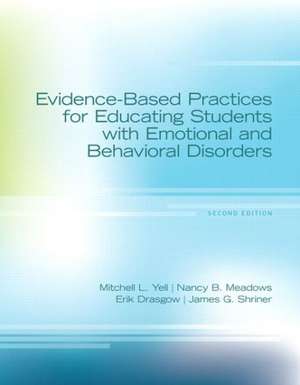Evidence-Based Practices for Educating Students with Emotional and Behavioral Disorders with Access Code
Autor Mitchell L. Yell, Nancy B. Meadows, Erik Drasgowen Limba Engleză Mixed media product – 23 mar 2013
Preț: 535.23 lei
Preț vechi: 660.78 lei
-19% Nou
Puncte Express: 803
Preț estimativ în valută:
102.43€ • 105.82$ • 85.25£
102.43€ • 105.82$ • 85.25£
Carte indisponibilă temporar
Doresc să fiu notificat când acest titlu va fi disponibil:
Se trimite...
Preluare comenzi: 021 569.72.76
Specificații
ISBN-13: 9780133386004
ISBN-10: 0133386007
Pagini: 456
Dimensiuni: 216 x 272 x 25 mm
Greutate: 1.13 kg
Ediția:2
Editura: Pearson
ISBN-10: 0133386007
Pagini: 456
Dimensiuni: 216 x 272 x 25 mm
Greutate: 1.13 kg
Ediția:2
Editura: Pearson
Textul de pe ultima copertă
With an emphasis on effective instruction, the second edition of Evidence-Based Practices for Educating Students with Emotional and Behavioral Disorders uncovers evidence-based practices that are most effective for teaching students with EBD. The text's practitioner-friendly style places emotional and behavioral disorders within the context of the classroom and includes information on how to manage student behavior, teach students specific content areas, and develop educationally meaningful and legally sound IEPs. Chapters are filled with useful advice for teachers and cover important topics such as assessment, law, positive behavior support, cognitive behavioral interventions, social skills training, and academic interventions. New to This Edition:
- Chapter 8 includes more information on individualized transition plans for older students and addresses an important requirement of IEPs for students age 14 and above.
- Chapter 8 provides a simple and effective method for converting goals into short-term objectives and shows how to easily align with state-specific IEP requirements.
- Chapters 5, 6, 7, 11, & 14 include easy-to-use data collection and interpretation methods which show teachers how to collect and use data to monitor student progress and make instructional decisions.
- Chapter 3 includes new material on the use of student accommodations in state-wide testing.
- Chapters 9 & 10 explore various techniques to promote positive student behavior in nonclassroom settings.
- A new Appendix includes information on the most frequently used psychoactive medications.
